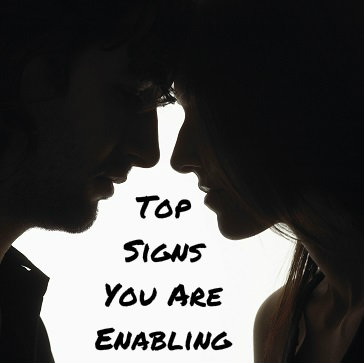09 Feb 2015
Are You Enabling Your Partner’s Addiction?
If your partner is using drugs or alcohol, there is a chance that you are enabling his habit. It may sound ridiculous at first. Why on earth would you want him to use? Why would you encourage him? The truth is that enabling is subtle, and you may be doing it in ways that even you don’t realize. Take the time to consider your role in the relationship and decide if you are an enabler or if you could be doing more to help him stop using.
What Is An Enabler?
An enabler is rarely overt. You’re probably not feeding your partner drugs or alcohol. You’re not likely to actively encourage him to go out and drink or to spend more money on drugs.
In most cases an enabler is someone who is more subtle. This is someone who takes away the consequences of drug or alcohol use so that the user doesn’t experience the full costs of his choices and behaviors. Enablers often believe that they are helping their loved ones, when in fact they are causing more harm. It is those consequences that should be an addict’s biggest motivation to stop using.
Signs Of Enabling
How can you tell if you are enabling your partner’s habit? Think about your actions and how you respond to his drug use or drinking. Consider whether the choices you make minimize the consequences he should be experiencing. Here are some concrete examples of what you might be doing if you are an enabler:
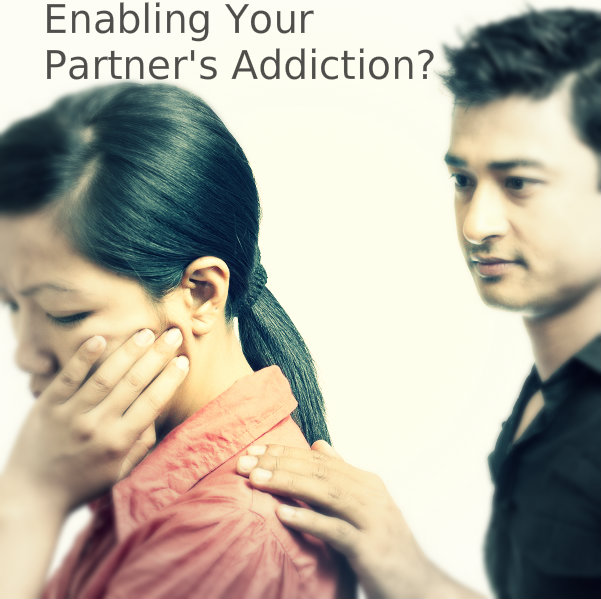 You give your partner money when he’s desperate. Money is the fuel for his addiction. If he runs out and you give him more, he will never experience the total loss of money caused by his habit.
You give your partner money when he’s desperate. Money is the fuel for his addiction. If he runs out and you give him more, he will never experience the total loss of money caused by his habit.
- You make excuses for him. When he misses appointments, days of work or school, or when he behaves inappropriately, there should be consequences. If you make excuses for him, he won’t feel the repercussions.
- You drive him wherever he needs to go. Whether he lies about it or not, chances are you are driving him to places where he uses or buys drugs.
- You help him when he gets into legal trouble. Legal problems are often a consequence of drug use or excessive drinking. If you help get him out of it, you’re enabling his habit.
- You keep quiet and don’t confront him about what worries you. Not talking to him about how often he passes out, how badly he behaves when high or drunk or how he is draining your bank account isn’t helping.
How To Stop Enabling And Start Helping
If you recognize yourself in the signs of enabling, you need to stop supporting your partner’s habit and start helping him get over it. Know that it isn’t easy to change your own behaviors, but it is crucial. Stop actively doing things that help him use, such as giving him money, transporting him, or making excuses when he messes up. He will be hurt, upset and even angry with you, but you have to remain strong in the face of his pushback.
Once you have made it clear that you will no longer be actively helping him use, sit your partner down for a frank talk and provide options for him to get help. If you are struggling with this or if you are afraid you’ll back down, enlist the help of other people who care about you and your partner. There is strength in numbers. It will be difficult, but if you are persistent your loved one will eventually feel the consequences of his habit and will have no choice but to make a change.
If You Need Help With Your Partner’s Addiction Or With Setting Up An Intervention – Call Us Now!
23 Oct 2014
When To Cut An Addict Out Of Your Life
Knowing when to walk away from an addict in your life is difficult, but there is an appropriate time to say enough is enough. The exact timing depends on you and the addict in your life. It is a personal choice to let go of this friendship or to cut this family member out and this is one decision that only you can make.
When you have exhausted your ability to help your loved one and he still won’t make any changes or even admit to having a problem, it’s time to at least consider walking away. You can’t make anyone change. Only he can make that ultimate choice.
Reasons To Cut Addict Out Of Your Life
As you contemplate your next move, here are some important reasons to cut an addict out of your life:
- You have devoted a huge amount of time and energy trying to help your loved one, to no avail. – You’ve learned about addiction to try
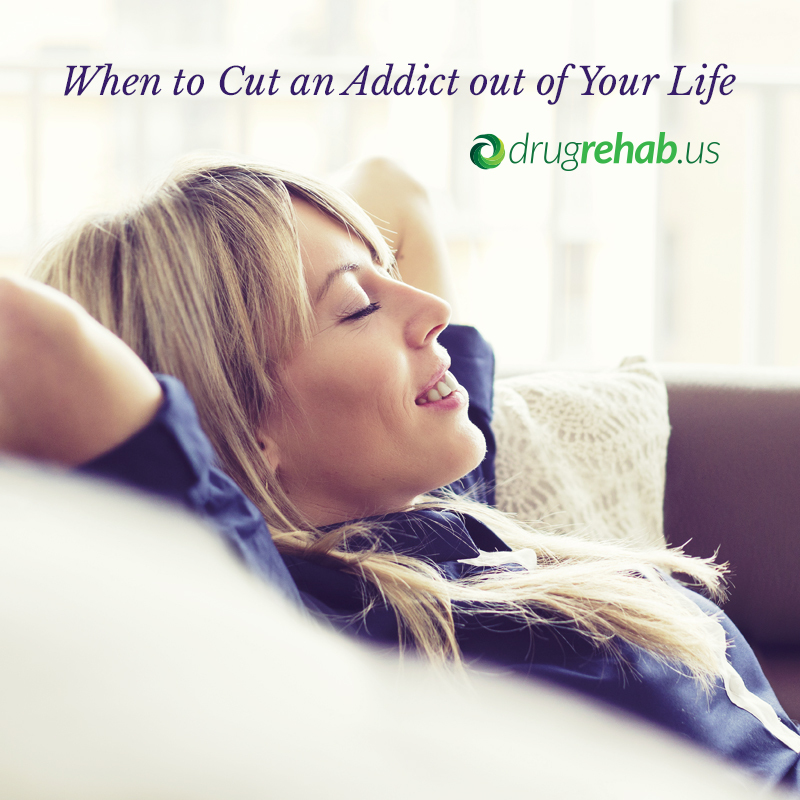 to understand what your loved one is going through. You staged an intervention and brought in a number of friends and family members to try to reach him. You spent countless hours trying to convince your friend that he has a problem and needs help. You set limits and boundaries and he continues to cross them. When your efforts are monumental and met with nothing but resistance, it may be time to move on.
to understand what your loved one is going through. You staged an intervention and brought in a number of friends and family members to try to reach him. You spent countless hours trying to convince your friend that he has a problem and needs help. You set limits and boundaries and he continues to cross them. When your efforts are monumental and met with nothing but resistance, it may be time to move on.
- Your friend has taken advantage of your charity. – It’s important for addicts to have friends and family members to support them, but when the addict still refuses to change and starts to take advantage, you have a problem on your hands. Not only is your loved one hurting you, but you have also become an enabler. Maybe he is taking your financial support, which you thought was helping him keep his apartment, and is spending it on drugs. Maybe he has stolen from you. Decide how much of this you can take and then change your locks and cut him off.
- Your loved one has become violent or frightens you. – The moment you feel your safety has been threatened, either by your loved one or his friends or acquaintances, tell him it’s over for now. Your safety should never be compromised by someone you love, no matter the situation. Take a zero-tolerance stance when it comes to violence or threats.
- Your health—emotional, physical or mental—is suffering. – Loving someone who is addicted can take a huge toll on your health. If your loved one’s situation is causing you increased levels of stress, to the point that it is causing physical symptoms, sleep loss, or other major issues, you have to consider making a change for your own well-being. You can’t help someone when you aren’t well yourself. Take time off to get better and then consider trying to help again.
Make The Decision But Offer Support If Your Loved One Gets Addiction Treatment Help
Cutting someone out of your life is a tough choice to make, but is sometimes inevitable. It’s important to try to help those you love, but you have to set limits and you have to consider yourself and your own well-being. Also know that this doesn’t have to be permanent. Tell your loved one that you are saying goodbye for now, but that if he can get his act together you will be back to fully support him in his sobriety. This should be a decision you make for yourself, but it may also turn out to be the motivation he ultimately needs to make that change.
Learn More About The Intervention Process And Steps
13 Oct 2014
Are You An Enabler?
Behind many addicts you’ll find enablers. An enabler can be a parent, a spouse or even a child, and usually her intentions are good. The problem is that loving an addict, supporting him and empowering him can often turn into enabling. When you enable the addict in your life you are only making the problem worse and preventing him from getting the help he really needs. So how do you know if you are helping or hurting?
What Is Enabling?
Enabling means taking away or covering up the consequences of your loved one’s addiction. Consequences are powerful motivators. When an addict destroys his relationships, loses his job or spends all his money on drugs he is forced to face the truth about his problem with drugs or alcohol. If you take actions to shield him from these consequences, he need not face the truth and he will likely keep doing what he is doing. You are enabling him.
Put this way it sounds pretty straightforward. When you’re in the thick of it, though, it can be tough to know if you are enabling your addict or helping him. You should help your loved one. You should empower him to get help for himself. Helping an addict doesn’t always mean tough love, but there can be a fine line between caring and enabling.
Signs You Are An Enabler
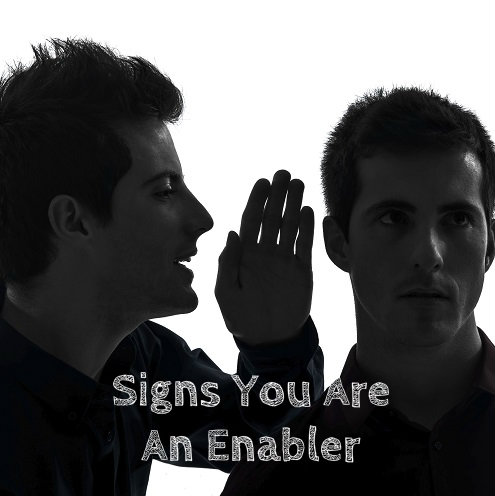 Here are some surefire signs that you are an enabler:
Here are some surefire signs that you are an enabler:
- You make excuses or lie – You cover up or gloss over bad things that your loved one is doing and make excuses to other people. For instance, you might explain away his embarrassing bender at a party by telling everyone that he was sick and the alcohol interacted badly with his cold medicine.
- You take on his responsibilities – For an addict, everyday responsibilities are usually the first thing to go south. If you pick up the slack by picking up the kids from school, doing his chores, taking care of his aging mother or anything else he is supposed to do, you are not letting him feel the consequences of his neglect.
- You put the blame for his problems on anyone but him – Addicts are great at assigning blame to third parties. It’s part of denial. You may add to the problem by encouraging this or telling him that he’s right. You may even blame yourself. The truth is that he makes his own decisions and he needs to realize that.
- You take care of him financially – Addiction costs money. Do you give him more money when he runs out? Do you pay the bills or legal fees? Helping him financially may seem unconnected to his addiction, but it isn’t.
- You avoid addressing the problem out of fear – If you are afraid to face the problem of your loved one’s addiction because you are afraid of a fight or that he will leave you, you are enabling.
How To Stop Enabling And Start Helping
If you recognize the enabler in your habits, it’s time to stop. Start with a conversation about the problem. Stop ignoring it. Tell your loved ones that things will change from now on. You will no longer take care of his responsibilities. You will no longer give him money. What you will do is support and love him. Offer to be there as he gets help or goes to rehab. Tell him and show him that you are there to help and support, but that he needs to get help. Once he starts to really feel the consequences of his addiction he will start to realize the extent of his problem.
Find Out If Are You The ‘Chief Enabler’ For An Addict – And What To Do About It
01 Oct 2014
Are You Codependent?
Codependency is a term that derived several decades ago from the term co-alcoholism. It was coined to describe the role of the spouse of an alcoholic. Today that term has evolved to head a number of symptoms of dysfunctional relationships, both those with an addict and without. A codependent relationship can exist without any type of addiction. But, if you are the partner or spouse of an addict your odds of being codependent are greater. What does this mean? And how do you know if you are codependent?
Having An Addicted Partner And Codependency
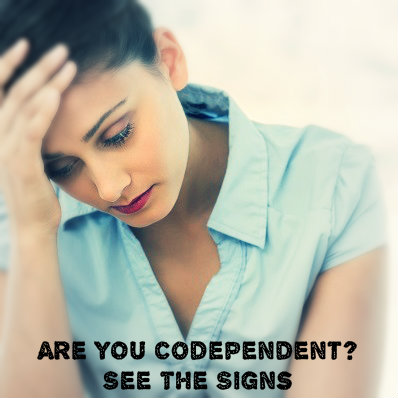 If you do have a partner addicted to drugs or alcohol, or even with a behavioral addiction, you should learn more about codependency and what it means. Your partner definitely needs treatment for addiction, but you may benefit from therapy as well. Being the partner of an addict takes its toll. A simple definition would state that being codependent means drawing your self-esteem and self-worth from your partner.
If you do have a partner addicted to drugs or alcohol, or even with a behavioral addiction, you should learn more about codependency and what it means. Your partner definitely needs treatment for addiction, but you may benefit from therapy as well. Being the partner of an addict takes its toll. A simple definition would state that being codependent means drawing your self-esteem and self-worth from your partner.
This type of dynamic often exists between an addict and their partner because of the balance they strike together. Addicts need someone to enable their habit, make excuses for them and care for them. Codependents need someone to care for and someone to need them. Together the two fit perfectly, if not healthfully.
Signs You Might Be Codependent
Are you codependent? Here are some signs that might indicate you are:
- You Have Low Self-Esteem – Codependents often have a poor sense of self-worth. They feel unworthy of love. They compare themselves to others and come up feeling inadequate. You may be good at hiding this, even from yourself, so dig deep and think about how you really feel.
- You Love To Please Others – If you are codependent, you take much of your self-worth from caring for someone else. As a result, you may be afraid to upset anyone. You can’t say no and you go out of your way to make sure others are happy, often at the expense of your own needs.
- You Ignore Warnings Signs – Problems that your partner has, like his addiction, are crystal clear to others, but you ignore them. You make excuses for his drug or alcohol use and his inappropriate behaviors. You stay in the relationship despite the fact that he is not meeting your needs.
- You Have Poor Boundaries – Codependents have a hard time setting or staying within relationship boundaries. You may have either weak or rigid boundaries. Maybe you share too much personal information or give too much of yourself. On the other hand, you may be withdrawn and unwilling to let anyone see what you’re feeling.
- You Need Control – You like to be in control because it makes you feel safe. This comes out in the form of controlling your partner, or trying to. Controlling can look like caring. Your need to please others or to care for your partner can be a form of control.
- You’re Afraid Of Being Alone – You see the issues in your relationship, but you ignore or deny them because you fear ending it. Being alone scares you because you take your sense of self-worth from your partner. You may be miserable, but you’re going to stay.
Treatment For Codependency
Codependency is not uncommon. If you see these signs in yourself and your relationship, you are far from alone. Still, this type of relationship is unhealthy, especially when one partner is an addict. Treatment can reverse codependency and help you learn to love yourself without needing someone else. Treatment can also help your partner overcome addiction. The important first step is to recognize the problem. Then you can both get help.
If You’re In A Relationship With An Addict Should You Stay Or Leave? Read More Now!
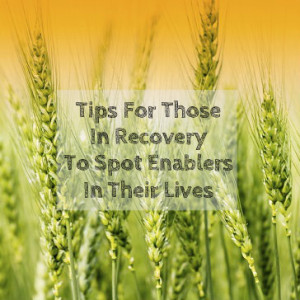 Getting sober is a major achievement and one you should be proud of. Addiction is a terrible disease and taking the steps to recognize it, to get help, and to get clean are important accomplishments. Now that you’re sober, you just need to maintain that sobriety. The process of recovering from addiction is a lifelong one, but there are things you can add to your life to help you avoid relapsing. Among these is the presence of healthy relationships. Ditch the enablers in your life and build new relationships with people who will support your sobriety.
Getting sober is a major achievement and one you should be proud of. Addiction is a terrible disease and taking the steps to recognize it, to get help, and to get clean are important accomplishments. Now that you’re sober, you just need to maintain that sobriety. The process of recovering from addiction is a lifelong one, but there are things you can add to your life to help you avoid relapsing. Among these is the presence of healthy relationships. Ditch the enablers in your life and build new relationships with people who will support your sobriety.
Who Are My Enablers?
Your enablers may not be easy to spot immediately. An enabler is anyone who encourages you to use drugs or drink, whether or not he means to do it. The way in which this person encourages your habit may be obvious. For instance, if you have friends from the days when you were using, and they are still using, it will be very difficult for you to be around them without giving in to temptation. These people may or may not actively encourage you to use, but the simple fact that they are not sober makes them enablers.
Enablers can also appear in more subtle ways. Maybe you have someone in your life that always made you feel bad about yourself. She criticizes you and attacks your sense of self-worth. She may not be telling you to use drugs, but by making you feel bad, she may cause you to be tempted to relapse. If you are not sure who might be bad for you as a sober person, ask someone you trust. Sometimes it’s easier for others to see the subtlety of an enabler.
What Is A Healthy Relationship?
A healthy and mutually supportive relationship, whether romantic or platonic, is one in which each person respects and trusts the other. Each person should also be honest with the other, even when it isn’t easy to tell the truth. People in healthy relationships communicate well with each other, they support each other and they maintain their own separate identities. If a friendship or romantic relationship, or even a relationship with a family member has these characteristics, and the person encourages you to stay sober, you have a healthy relationship.
How Do I Make New Friends?
So what if your relationships are mostly unhealthy leftovers from the days when you were using? It’s time to make new friends. First, turn to family members with whom you can establish, or re-establish, a meaningful relationship. You may feel intimidated by the idea of making new friends, but your family is not likely to turn you down. Rebuilding relationships with your family will give you the confidence to go out and meet new people.
When you’re ready to venture out and find new, sober friends, consider starting with your support group. You can make great friendships with people who understand where you have been and that you want to stay sober. Together, you can help each other avoid relapse. You might also turn to other organizations that are important in your life, such as your church or your school. Getting involved in volunteer work also gives you the opportunity to make new friends who will share your values.
Nourishing New Friendships
Once you have new, healthy, and supportive relationships, be sure to nourish them. Friendship is all about give and take. You will benefit greatly from having sober friends, but make sure you give back to them as well. Be a good friend and you will reap the rewards of healthy relationships.
Read More To Find Out If You Are A Chief Enabler For An Addict
Continued From – In A Relationship With An Addict: Stay Or Leave? Part 1
Addressing Codependency Within Yourself
If, through Al-Anon or CODA, you have identified codependent tendencies, it is time to seek help for that problem specifically. A relationship with an addict is never healthy, but neither is a relationship with a codependent. Codependency is a pattern that mimics addiction. If you hope to have healthy, functional relationships in the future, it is imperative that you begin working through this condition.
Ending a cycle of co-dependency is not easy and professional help may be required, as these patterns are usually deeply ingrained and rooted in childhood experience. Learning new, healthy patterns for relationships is not automatic and needs to be addressed intentionally.
Learning To Recognize The Deception And Manipulation Of Your Addict Partner
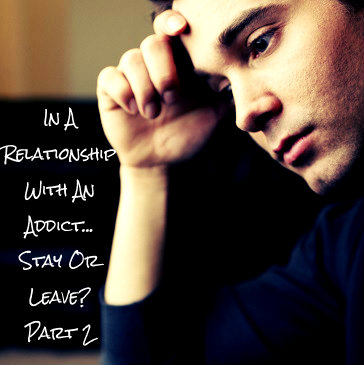 How many times has your addict partner blamed you for his or her problems? Or, when you confronted your partner about the addiction, the focus was shifted to you, claiming that if only you were more this or less that, the addicts wouldn’t drink or use in this way? What about all of the excuses of an addict?
How many times has your addict partner blamed you for his or her problems? Or, when you confronted your partner about the addiction, the focus was shifted to you, claiming that if only you were more this or less that, the addicts wouldn’t drink or use in this way? What about all of the excuses of an addict?
Your partner’s addiction is, in no way, related to you or your perceived failings as a partner. Addicts are masters of deception, blame-shifting, excuse-making, and manipulation. Are you falling for it? Do you believe the addict even when you suspect he or she is lying? Do you fail to acknowledge red flags? Part of codependency is smoothing over issues or matters that may cause a fight but should be addressed. Are you allowing yourself to be manipulated?
Recovery May Not Be The Answer For The Relationship
As the non-addict partner, your focus has been on the addict—their needs, their issues, their failings, their protection, and their need to get into recovery. And sometimes the addict does actually pursue recovery, get sober, and join a 12-step community. It seems like this would be the ideal situation.
Not necessarily. Indeed, recovery is always the answer for the addict. There is never a time when it is better to stay in addiction than to get into recovery. But recovery may not be the “answer” for your relationship. The combination of an addict (them) and a non-addict/potentially co-dependent (you) creates a certain relational pattern that, while perhaps not ideal, is familiar. The addict is accustomed to being the screw-up or the authoritarian, and the non-addict is slotted into the role of caregiver, protector and hero.
Recovery changes that. Suddenly the sober addict is bringing a new dynamic to the relationship—taking ownership of their faults, attempting to set proper boundaries, devoting time to recovery and a 12-step community, and seeking the direction of a higher power. This can leave the non-addict in a quandary, not knowing how to act or respond to the sober partner, and not appreciating the shift in roles. Co-dependents get their fix from being rescuers, enablers and controllers. When they are relieved of that role, conflict often results.
Breaking Up With An Addict
A relationship with an addict can never be anything less than toxic. If you are dating rather than married to an addict, the ease with which you can leave the relationship is greater. In the case of marriage where children and a shared home may be involved, other tactics and attempts at recovery should be employed before declaring the marriage over.
For those who are in a dating relationship, the ties with an addict are somewhat easier to sever. While a breakup is always painful, you won’t have the added challenge of a legal battle. The hassle of splitting up possessions or finding a new place to live should not be a deterrent. Freedom and healing is worth that price.
If you fear that your attempts to leave the relationship will be met with violence or other maliciousness, it is wise to involve law enforcement, obtaining a restraining order if necessary. It is also helpful to have the names and phone numbers of shelters in your area where you could stay anonymously for a period of time if necessary.
Listening To Wisdom Of Others And Making A Healthy Decision For Yourself
While the opinions and advice of others need not dictate your life and the decisions you make regarding your relationship, it is often wise to listen to people around you. If your family and close friends are consistently encouraging you to send your partner packing, you may want to take heed. Think they don’t know him like you do, or that they just can’t see the real her? You may be right, but at some point you may need to ask yourself if you are the one who is not seeing the situation in all of its reality.
Whether you decide to stay or leave, you are seeing that not all problems in your relationship are the addict’s. You are gaining awareness of your own faults and perhaps your unrealistic expectations. Only you can decide if this relationship is right for you, but you are gaining the knowledge and understanding to help you make an informed and healthy decision.
Read More About How To Handle A Loved One With An Addiction
You know your partner battles an addiction and you’ve seen the toll it is taking on your relationship, not to mention your own well-being and sanity. Yet you stay. And the problem continues. How do you recognize an addict’s excuses? Is it possible to have a healthy relationship with an addict? Should you even try? How do you decide when it’s time to call it quits?
Unhealthy Attracts Unhealthy In Relationships
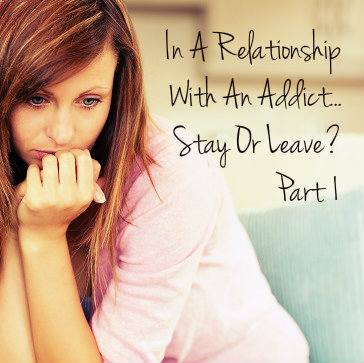 It helps to begin with a little soul searching. What keeps you in a relationship with an addict in the first place? The reality is that people who maintain relationships with addicts are often operating from a place of co-dependency and emotional neediness. Whether or not you stay in the relationship, it is probably time to start looking at some of your own issues.
It helps to begin with a little soul searching. What keeps you in a relationship with an addict in the first place? The reality is that people who maintain relationships with addicts are often operating from a place of co-dependency and emotional neediness. Whether or not you stay in the relationship, it is probably time to start looking at some of your own issues.
It is easy to make the relationship about the other person and his or her addiction and to be constantly focused on catering to the needs of the one who seems to be the “problem.” As a result, the non-addict doesn’t see the need to work on him or herself. In normal relationships, each partner is growing and changing in partnership with the other. In the case of a relationship with an addict, however, this normal growth and progression stagnates—often for both partners.
Examine Your Motives When In A Relationship With An Addict
People in relationships with addicts often avoid trying to honestly discover why they are in the relationship in the first place. No one can tell you it is time to end the relationship, but you might ask yourself why you think you want, or need, to stay.
Questions To Help You Work Through The Feelings Of Continuing Or Ending The Relationship With An Addict
- Are you afraid of being alone?
- Are you afraid you can’t find anyone better than your current partner?
- Do you believe that you can change him/her?
- Do you think you can love him/her out of the addiction and into a clean life?
- Do you optimistically believe that somehow things will just work out, even though there had been no evidence of that?
- Do you tell yourself it’s not that bad?
- Are you afraid of drastic consequences if you leave the addict? Has he or she threatened harm to self, you, or others if you end the relationship?
- Are you avoiding the hassle? Are you too lazy to make the break and deal with the consequences of splitting possessions and potentially having to find another place to live?
- Are you afraid to discuss the problems in your relationship or your desire to leave for fear of starting a fight? Are you afraid of physical abuse?
- Is the addict working to convince you there isn’t a problem, but maybe your gut is telling you differently?
- Has the addict vowed to go to AA, but failed to follow through?
- Do you think the addict can’t make it on his own without you?
- Are you afraid to present an ultimatum?
More “yes” answers than “no” suggest strong co-dependent tendencies.
Work On You And Your Own Issues
Any time spent in a relationship with an addict can be crazy-making. It is time to start working on you. Seeking your own recovery can often help you to better decide whether you should try to keep the relationship going or end it.
Start by attending an Al-Anon meeting in your area. Al-Anon can help you to better understand addictive patterns and tendencies and give you the tools and support for working with them. You will learn about yourself, and why you stay with an addict, and how to set better boundaries if you do stay in the relationship.
Co-Dependents Anonymous (CODA) is another group worth seeking out. Partners of addicts commonly suffer from codependent tendencies. A group like CODA takes the focus off of healing the addict and puts it onto healing and discovering you.
Whether or not you choose to stay with the addict, and whether or not he or she will get help, you need help and support in dealing with the addiction, and eventually healing from it.
People who have been brainwashed by a relationship with an addict often repeat unhealthy relational patterns in subsequent relationships. Attending Al-Anon can help the non-addict partner learn the realities of addiction and co-dependence, and can be an eye-opening experience of personal growth and development.
Hitting Bottom In The Relationship
As you wait for the addict to hit bottom and reach his or her limits, you might think about your own limits. What does it mean for you to hit bottom in this dysfunctional relationship? Partners of addicts become accustomed to responding to the needs of the addict without considering their own personal needs and preferences. In order to be ready to leave the relationship, you will have to hit your own bottom—the place of complete despair and desperation. It is at this point that you will be ready for a change. Have you hit bottom in your relationship with the addict?
Continued In – In A Relationship With An Addict: Stay Or Leave? Part 2
Who recognizes that they are enabling? Who enables so intentionally? And yet, if we have addicts in our lives, we must look carefully at how we interact with them. How do we handle a loved one with an addiction? The years of dealing with the addiction of a loved one blind us to our own actions and their consequences. Much of what we think is “helping” can actually be quite harmful.
Signs You Are Enabling
- Do you make excuses for the addict (e.g., lying to an employer to explain why the addict isn’t showing up for work)?
- Do you lie or deceive to protect the addict or your family’s image?
- Do you intentionally overlook bad behavior, saying that the addict “can’t help it?”
- Do you feel like you bear the brunt of consequences for the addict’s behavior?
- Do you continue to allow an addict son or daughter to live in your home despite substance abuse and his or her unwillingness to follow house rules?
- Do you loan or give money to the addict?
- Have you bailed the addict out of jail, or lied to protect him or her from getting in trouble with the law?
- Do you clean up the resulting mess? This can refer to the physical mess the addict makes during or after a binge as well as the messes he or she is making in life.
- Do you make his or her problems your responsibility?
- Are you trying to protect the addict from hitting bottom?
- Do you experience anxiety over the consequences the addict may experience as a result of his or her substance abuse?
- Do you excuse or overlook the addict’s words or actions when drunk or high?
- Do you feel guilty if you don’t help the addict?
- Do you do things for the addict that he or she can do for him or herself?
- Are you unable to say “no” to the addict?
- Do you live in fear of the addict?
- Are you constantly changing your plans to accommodate the addict’s antics, dramas and needs?
How Enabling Hurts Rather Than Helps The Addict
Enabling does not help or aid, rather it communicates the message that the addict’s actions have no consequences, or that if they do, someone (you) will be there to fix it, clean it up or excuse it away. If you are beginning to recognize enabling patterns in your relationship with the addict, know that it is not your fault. Life with a drug or alcohol addicted parent, spouse or child warps us. We are forced to find a means of coping with a situation that gradually grows more and more severe over time. In the beginning, a little helping isn’t an abnormal thing, but this helping subtly morphs, along with the addiction, into a full-blown condition.
What Can You Do Instead Of Enabling The Addict In Your Life?
What is the alternative? Letting go. And it will be painful to do. You may watch the addict lose jobs, get into trouble with the law, live in squalor, sink into poverty, and suffer all sorts of physical, mental and emotional discomforts. It will be as hard on you to watch as it will be for the addict to live through. You will want so badly to do something.
But when you do, you impede the addict from reaching that point at which he or she will become convinced of the need for a change, also known as “hitting bottom.” The longer you enable the addict and the addiction, the longer it will take the addict to pursue recovery. Get the support you need—either through Al-Anon, therapy or other support systems—and then call a halt to the cycle of enabling and addiction.
Learn How To Set Up A Safe Intervention For Your Addicted Loved One!


